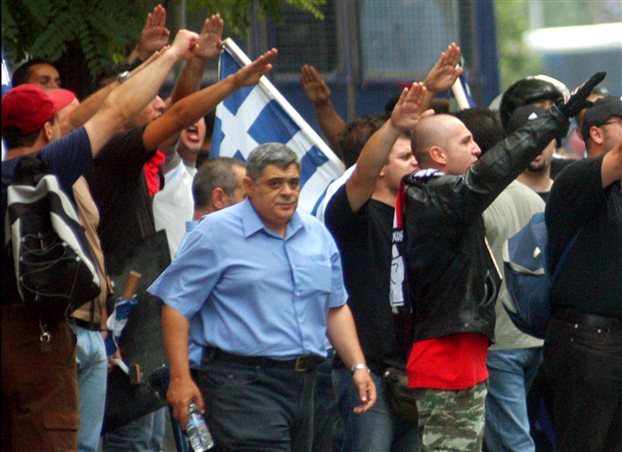The Guardian reports: Almost three years into the debt crisis that began beneath the Acropolis there is no doubt in the minds of many that Greece is at war – an economic war whose byproducts of poverty and hate, anger and desperation have begun inexorably to tear its society apart. And for the great majority the EU – with Germany at the helm – is solely to blame.
“It’s a new kind of war, one without weapons but just as deadly,” said Takis Kapeoldasis, a tattoo artist, giving voice to the mood at large. “I don’t want to be insulting but it’s Europe’s policies that have done us over and now it gets the prize of all prizes for peace and reconciliation.
“Those who made this choice should come and walk our streets now while there is peace and harmony because soon it’s going to be too late.” For young Greeks like Karmela Kontou, who belong to the generation hardest hit by the country’s descent into economic and social meltdown, the idea that the EU had been rewarded for its “successful struggle” to reinforce democracy and human rights was especially galling. After all, she said, “more and more Greeks are killing themselves” precisely because they see no light at the end of the tunnel.
Even worse was the democratic deficit. Growing numbers of Greeks feel they have no democratic say over any of the policies that have changed their lives. Greece may be paying for years of profligacy but the coffins of those who could no longer take the pain of being unable to pay extra bills and higher taxes on wages that had also decreased sharply were also lining up.
“The mood is not just dark, it’s hopeless. People are killing themselves, the suicide rate is soaring, because they just can’t cope and the EU is definitely partly to blame,” said a 25-year-old.
Yiannis Baboulias writes: The timing is nothing if not ironic. On the day the EU has been awarded the Nobel peace prize, we watch as Europe sits idly by and lets fascism brew once again – this time in Greece. If a sharp turn towards religious fundamentalism and fascism is to be avoided, Europe needs to act now.
On Thursday night the Athens premiere of Terrence McNally’s play, Corpus Christi, was cancelled following protests by members of the far-right party Golden Dawn (including some MPs) and religious groups.
The protest had a clearly homophobic agenda. Manolis V, a journalist, was attacked by protesters while the police apparently did nothing: “The police is next to us. I shout ‘They’re beating me, aren’t you going to do something?’,” he wrote on Twitter. “I move away so I can look on from distance. A well-known Golden Dawn MP follows me. He punches me twice in the face and knocks me to the ground. While on the ground, I lose my glasses. The Golden Dawn MP kicks me. The police are just two steps away but turn their back.”
The spectacle of fascists physically attacking people whose moral agenda they disapprove of has become routine in today’s Greece. What should come as more of a shock is the tacit approval of the police.
Meanwhile, Reuters reports: Greece’s unemployment rate hit a new record in July with one in four now out of work, like in Spain, as a crippling recession and austerity measures continued to take a toll on the labour market.
Unemployment rose for a 35th consecutive month to 25.1 percent in July, more than double the euro zone average and up from a revised 24.8 percent in June, Greece’s statistics service ELSTAT said on Thursday.
The jobless rate has more than tripled since the debt-laden country’s five-year recession began in 2008 and now stands at 54 percent for those aged between 15 and 24 years, compared with 22 percent in July 2008.
A record 1.26 million Greeks were without work in July, up 43 percent from the same month last year.
The slump in the Greek economy is expected to accelerate later this year if the government implements further budget cuts of almost 12 billion euros over the next two years as a pre-condition for more funds under its EU/IMF bailout.




